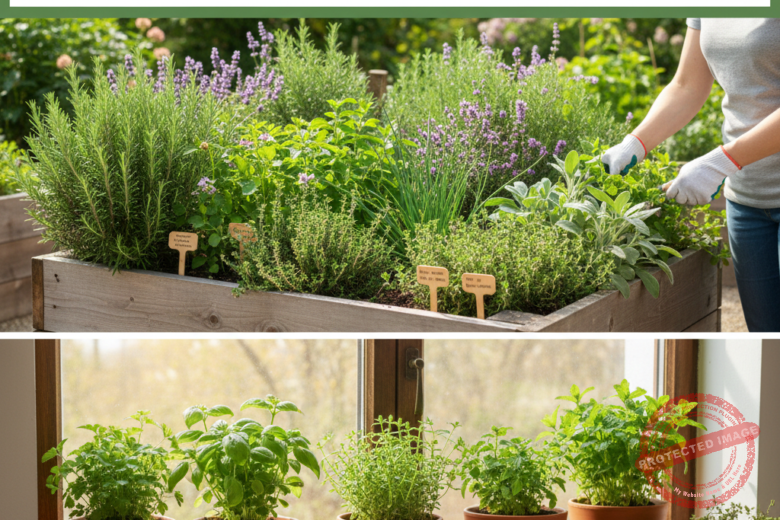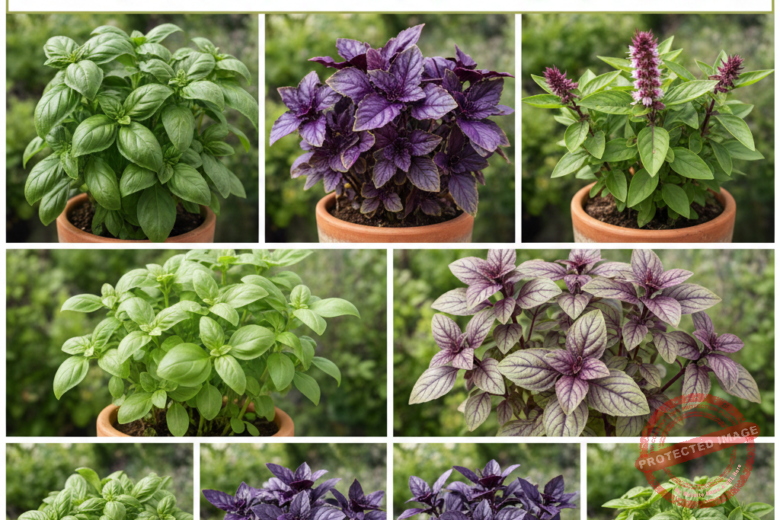Gardening can be a delightful hobby, but it can also come with its own set of challenges, especially when deer and rabbits decide to munch on your hard work. If you’re tired of seeing your beautiful garden turn into a buffet for local wildlife,
it’s time to consider planting perennials that are naturally resistant to these persistent pests. In this comprehensive guide, we’ll explore 20 top deer and rabbit resistant perennials that will not only add beauty to your garden but also save you from the frustration of constant animal damage.
20 Top Deer and Rabbit Resistant Perennials for Your Garden
Here are some perennials for Your Garden that will chase deer and rabbit away from your garden.
1. Lavender (Lavandula spp.)
Lavender is a fragrant and visually appealing perennial that is rarely bothered by deer or rabbits. Its strong scent is unappealing to these animals, making it an excellent choice for a pest-resistant garden. Lavender thrives in full sun and well-drained soil, and its purple flowers can add a touch of elegance to any landscape.
Growing Tips:
- Plant in a sunny location with well-drained soil.
- Prune annually to maintain shape and encourage growth.
- Avoid overwatering, as lavender prefers dry conditions.
2. Russian Sage (Perovskia atriplicifolia)
Russian Sage is another excellent option for deer and rabbit resistant gardens. This hardy perennial features tall, airy spires of lavender-blue flowers that bloom from midsummer to fall. Its aromatic foliage and woody stems are unappealing to herbivores.
Growing Tips:
- Plant in full sun with well-drained soil.
- Tolerates drought once established.
- Prune back in early spring to encourage new growth.
3. Salvia (Salvia spp.)
Salvia, or sage, includes a wide variety of perennials known for their vibrant flowers and aromatic foliage. Most salvias are deer and rabbit resistant, making them a great addition to any garden.
Growing Tips:
- Plant in full sun with well-drained soil.
- Deadhead spent flowers to encourage continuous blooming.
- Prune lightly after flowering to maintain shape.
4. Catmint (Nepeta spp.)
Catmint is a versatile perennial that produces clusters of blue or purple flowers throughout the summer. Its strong scent deters deer and rabbits, while its drought tolerance makes it a low-maintenance choice.
Growing Tips:
- Plant in full sun to partial shade with well-drained soil.
- Cut back after the first bloom to encourage a second flowering.
- Divide clumps every few years to maintain vigor.
5. Coneflower (Echinacea spp.)
Coneflowers are known for their large, daisy-like flowers and resilience against pests. These hardy perennials attract pollinators while deterring deer and rabbits with their rough texture and strong scent.
Growing Tips:
- Plant in full sun with well-drained soil.
- Deadhead spent flowers to prolong blooming.
- Divide clumps every 3-4 years to maintain plant health.
6. Yarrow (Achillea millefolium)
Yarrow is a tough, drought-tolerant perennial with feathery foliage and clusters of tiny flowers. Its bitter taste and strong scent make it unappealing to deer and rabbits.
Growing Tips:
- Plant in full sun with well-drained soil.
- Tolerates poor soil conditions and drought.
- Cut back after flowering to encourage new growth.
7. Bee Balm (Monarda spp.)
Bee Balm is a favorite among pollinators but not so much among deer and rabbits. Its aromatic foliage and showy flowers make it a standout in any garden.
Growing Tips:
- Plant in full sun to partial shade with moist, well-drained soil.
- Divide clumps every few years to prevent overcrowding.
- Deadhead spent flowers to encourage more blooms.
8. Coreopsis (Coreopsis spp.)
Coreopsis, or tickseed, produces bright yellow or orange flowers that bloom from early summer to fall. Its tough, wiry stems and bitter foliage deter deer and rabbits.
Growing Tips:
- Plant in full sun with well-drained soil.
- Deadhead regularly to prolong flowering.
- Divide clumps every 2-3 years to maintain vigor.
9. Butterfly Weed (Asclepias tuberosa)
Butterfly Weed is a magnet for butterflies but a turn-off for deer and rabbits. Its bright orange flowers and tough foliage make it a durable addition to any garden.
Growing Tips:
- Plant in full sun with well-drained soil.
- Tolerates poor soil and drought conditions.
- Avoid disturbing the roots, as they are sensitive to transplanting.
10. Hellebore (Helleborus spp.)
Hellebores, also known as Lenten roses, bloom in early spring with nodding flowers in various colors. Their leathery leaves and toxic compounds make them unpalatable to deer and rabbits.
Growing Tips:
- Plant in partial to full shade with well-drained soil.
- Mulch annually to retain moisture and regulate soil temperature.
- Remove old leaves in late winter to make way for new growth.
Read Also: 10 Herbal Remedies for Goat Coughing and Sneezing
11. Foxglove (Digitalis purpurea)
Foxglove is a striking biennial or short-lived perennial with tall spikes of tubular flowers. Its toxic foliage deters deer and rabbits.
Growing Tips:
- Plant in partial shade with well-drained soil.
- Allow some flowers to set seed for natural reseeding.
- Be cautious, as all parts of the plant are toxic if ingested.
12. Japanese Anemone (Anemone hupehensis)
Japanese Anemone produces delicate, windflower-like blooms in late summer and fall. Its tough roots and unpalatable foliage make it resistant to deer and rabbits.
Growing Tips:
- Plant in partial shade with well-drained soil.
- Mulch to keep roots cool and retain moisture.
- Divide every few years to control spread and maintain vigor.
13. Bleeding Heart (Dicentra spectabilis)
Bleeding Heart is known for its heart-shaped flowers that dangle from arching stems. Its toxic foliage is unattractive to deer and rabbits.
Growing Tips:
- Plant in partial to full shade with moist, well-drained soil.
- Mulch to retain moisture and keep roots cool.
- Cut back after flowering if foliage declines.
14. Black-eyed Susan (Rudbeckia hirta)
Black-eyed Susans are hardy perennials with bright yellow petals surrounding a dark brown center. Their rough texture and bitter taste deter deer and rabbits.
Growing Tips:
- Plant in full sun with well-drained soil.
- Deadhead spent flowers to encourage more blooms.
- Divide every few years to prevent overcrowding.
15. Peony (Paeonia spp.)
Peonies are beloved for their large, fragrant blooms and glossy foliage. Their bitter taste and tough texture make them deer and rabbit resistant.
Growing Tips:
- Plant in full sun with well-drained soil.
- Avoid planting too deep; eyes should be just below the soil surface.
- Support heavy blooms with stakes or rings to prevent flopping.
16. Baptisia (Baptisia australis)
Baptisia, or false indigo, produces spikes of blue, white, or yellow flowers in late spring. Its tough foliage and deep roots make it resistant to deer and rabbits.
Growing Tips:
- Plant in full sun with well-drained soil.
- Tolerates poor soil and drought once established.
- Avoid disturbing the roots, as they are sensitive to transplanting.
17. Lamb’s Ear (Stachys byzantina)
Lamb’s Ear is a low-growing perennial with soft, velvety leaves. Its fuzzy texture is unappealing to deer and rabbits.
Growing Tips:
- Plant in full sun with well-drained soil.
- Tolerates poor soil and drought conditions.
- Divide clumps every few years to maintain vigor.
18. Columbine (Aquilegia spp.)
Columbine produces delicate, nodding flowers in a variety of colors. Its toxic foliage makes it unattractive to deer and rabbits.
Growing Tips:
- Plant in partial shade with well-drained soil.
- Allow some flowers to set seed for natural reseeding.
- Cut back after flowering to encourage new growth.
19. Sedum (Sedum spp.)
Sedum, or stonecrop, is a succulent perennial with fleshy leaves and clusters of star-shaped flowers. Its tough texture and bitter taste deter deer and rabbits.
Growing Tips:
- Plant in full sun with well-drained soil.
- Tolerates poor soil and drought conditions.
- Divide clumps every few years to maintain plant health.
20. Agastache (Agastache spp.)
Agastache, or hyssop, produces spikes of tubular flowers that attract pollinators but not deer or rabbits. Its aromatic foliage is unappealing to herbivores.
Growing Tips:
- Plant in full sun with well-drained soil.
- Deadhead spent flowers to encourage continuous blooming.
- Prune lightly after flowering to maintain shape.
Conclusion
Creating a deer and rabbit resistant garden doesn’t mean sacrificing beauty or variety. By selecting perennials that are naturally unappealing to these pests, you can enjoy a thriving, low-maintenance garden filled with vibrant colors and diverse textures. From the aromatic lavender to the striking foxglove, these 20 perennials offer something for every garden style and climate.
By incorporating these plants into your garden, you’ll not only reduce the frustration of dealing with hungry wildlife but also create a beautiful, resilient landscape that can be enjoyed for years to come. Happy gardening!



